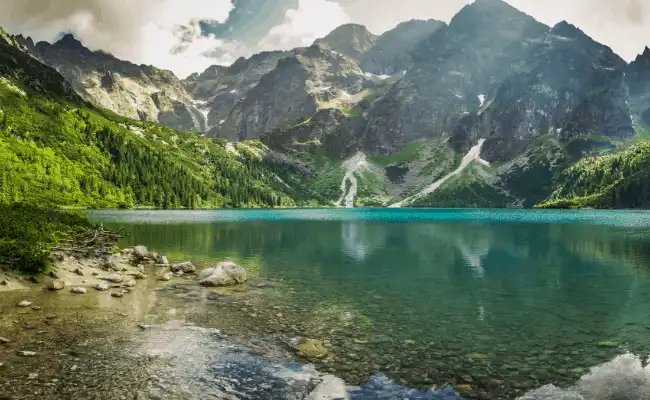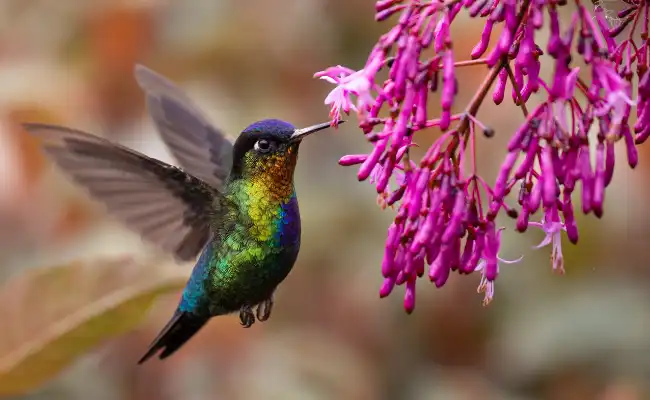A man who went to live life deliberately in the woods and contemplate only the necessary facts of existence so that he could draw forth its teachings once said: “In wildness is the preservation of the world.”
That man was Henry David Thoreau. His statement was far more than lofty transcendentalism that made for a great quote; its point is remarkably lucid and startlingly tangible. Embracing and safeguarding wildness (which we use interchangeably with nature and biodiversity in this article) is the physical and philosophical preservation of the world. Wildness physically preserves our world by keeping the essential functions of the planet pulsating through means of oxygen-producing fauna and nutrient-fixing and -cycling organisms. Wildness is also the philosophical preservation of the world, for it has been the raw material with which we have gathered the elements for ideas that have advanced humanity’s thoughts and actions. So much so that we continue to replicate and “improve upon” the building blocks and perfection of nature to this day.
Through both physical and philosophical means, biodiversity has given everything and we have taken unreservedly and ungraciously, like a selfless mentor imparting his wisdom upon an impudent pupil. Biodiversity’s vitality isn’t a matter of morality, ethics, or interests (economical, recreational, etc.) because it goes far beyond such limited and compartmentalized thinking.
Losing our biodiversity, or wildness, is losing a part of ourselves. We lose a part of our consciousness as we continue to destroy by forgoing the inspiring and restorative effects conveyed by nature. The elevated state of mind and emotion that nature instills is simply incomparable to anything that modernity can produce. It awakens us from a state of contemporary torpor that is deprived of substance. These reasons and the ones to follow are why biodiversity matters.
Biodiversity Evokes Empathy
Biodiversity inspires and demands us to grow in our empathy and embrace meaningful values. Adopting an empathetic view of biodiversity is imperative to accepting our role as stewards of this planet, which is the only way to ensure our continued existence and prosperity.
If there is no empathy for the living fauna and flora that are simply striving to exist like ourselves, we greatly lose sight of our own fundamental motivations. This requires a critical examination of our character. Nature does not need to be coddled nor propped up by us, but it does need our domineering disposition to show some restraint and give it space without exploitation.

Provides Substance For Our Thoughts
Biodiversity is our richest source of ideas. Ideas about behavior, innovation, strategy, etc. stems from the almost unlimited variety found in the natural world. Variety, like in many aspects of life, is enriching to our experiences and perceptions.
Our natural world offers more variety than we could ever become complacent with or disinterested in. Each species is a walking tome, contained within it millions of years of progressing content. The potential for knowledge arising from interpretation of, and attempts at understanding, the natural world is infinitely boundless. It has led the way for many of society’s greatest advancements.
Before man developed systems of thought with which to expand upon and develop ideas, all sources of knowledge came from the natural world. It still provides unrivaled insight into the many aspects of our lives and interactions.
Source Of Continual Adventure
Biodiversity allows us to live a new adventure everyday, away from the monotonous and mundane that we find ourselves in. Compulsory duties, hollow interactions, and frequent distractions dominate our lives, but nature provides an escape from it all.
When you develop an appreciation for nature, you will be utterly surprised at how quickly it turns into a passion. Nature doesn’t share the same qualities that our lives do, like abiding by a schedule or the need to “make a living”. Nor is it subject to social constructs, petty politics, and the like.
Because of this, nature is unrestrained and uninhibited; it is a world where almost anything is possible. If you have a slice of biodiversity and interest, you can immerse yourself in a new, enlightening experience everyday.
At all of our residences, we have embraced a passion for biodiversity and taken it in through all of our senses. We often carry our binoculars while walking slowly and deliberately, observing all that we can. We see different collections of plants, birds, and other animals every time we go out.
A unique mix of behaviors, colors, and sounds reward us as we embrace our surroundings. It may be the same path and the same stretch of area every day, but due to the dynamism of biodiversity and the passion that courses through us – we are graced with walking through a different world every visit.
Enlightens Through Perspective
Biodiversity gives powerful perspective. It allows us to see that we are a part of something much bigger and more meaningful. To make sure I am clear, I do not mean thinking that we are just a part of something bigger in a societal sense. Because, despite the effects of our species’ actions being disproportionate, we are but a small footnote on this marvelously complex organism that we call earth. The poor condition of our current state of biodiversity allows us to see our overconsumption and negligence, manifesting itself in our own self-defeat.
Essentially, it allows us to see the error of our ways. The loss of biodiversity is a harbinger of future ruination – a thought we should be greatly affected by since nature is a force of incredible resiliency. It is not easily deterred, nor quickly vanquished, and certainly adaptable beyond the comprehension of our limited knowledge. If there is a loss of biodiversity borne from our own actions that are so unreserved and uninhibited, things are gravely out of sorts.
It is not only unsettling in itself to see the current loss of biodiversity and to contemplate further loss, but it is also unsettling that we are unraveling systems we do not yet understand. Our comprehension of nature’s complex interactions is woefully insufficient. Because of this, we are not realizing the benefits, inspiration, breakthroughs, etc. that could come from preserving, studying, and experiencing nature. We are essentially giving up on the potential of ever finding out innumerable amounts of insight and wisdom.

Wellspring Of Amazement
Biodiversity sweeps us up in awe and fascination. The behavior and abilities of life other than our species is utterly and undeniably incredible. Getting the chance to witness the capabilities that adaptations have manufactured from eons of harnessing randomness and disorder is something to behold with wonder.
The marvelously complex and efficient forms and functions of nature are humbling to say the least; a sort of otherworldly intelligence and creativity that we had no control or force in creating. Wondering how nature can do the things that it does is a source of ceaseless enchantment, much of which makes our natural abilities pale in comparison. This rightfully puts us in our place when we feel that all of the wonders of the world are the ones that developed from our own thoughts and actions.
Biodiversity Should Be Preserved At All Costs
When we set aside all of the artificialities that define our lives, we realize that the natural world is true substance. It is omnipresent despite how much we try and wrap the world up in our design.
Biodiversity is the protection of the world. Without it, we simply have the tenuous world that we have worked up ourselves: unrelentingly excessive, precariously unstable, and motivated by personal interest. Without the raw vitality of nature, life’s essence is corrupted.
Since our existence, biodiversity has permeated our inspiration, propelled us forward in our mimicry of her design, and elevated our well-being through the enjoyment and adventure it has provided. Far too many of us fail to understand the value and lifeblood that nature and its biodiversity brings to our lives. But we need to wake up so that we might experience it and fight for its preservation.
Thoreau also said: “To be admitted to Nature’s hearth costs nothing. None is excluded, but excludes himself. You have only to push aside the curtain”. Join us in pushing aside the curtain.

